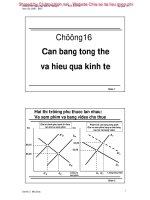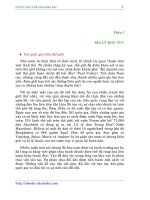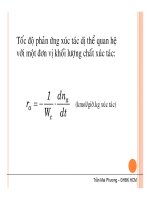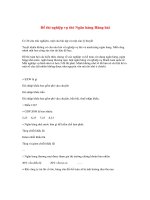The masquerader
Bạn đang xem bản rút gọn của tài liệu. Xem và tải ngay bản đầy đủ của tài liệu tại đây (955.99 KB, 229 trang )
TheProjectGutenbergEBookofTheMasquerader,byKatherineCecilThurston
ThiseBookisfortheuseofanyoneanywhereatnocostandwith
almostnorestrictionswhatsoever.Youmaycopyit,giveitawayor
re-useitunderthetermsoftheProjectGutenbergLicenseincluded
withthiseBookoronlineatwww.gutenberg.org
Title:TheMasquerader
Author:KatherineCecilThurston
ReleaseDate:April,2004[EBook#5422]
LastUpdated:March16,2018
Language:English
***STARTOFTHISPROJECTGUTENBERGEBOOKTHEMASQUERADER***
ProducedbyAnAnonymousVolunteerandDavidWidger
THEMASQUERADER
ByKatherineCecilThurston
CONTENTS
I
II
III
IV
V
VI
VII
VIII
IX
X
XI
XII
XIII
XIV
XV
XVI
XVII
XVIII
XIX
XX
XXI
XXII
XXIII
XXIV
XXV
XXVI
XXVII
XXVIII
XXIX
XXX
XXXI
XXXII
XXXIII
XXXIV
I
Two incidents, widely different in character yet bound together by results,
marked the night of January the twenty-third. On that night the blackest fog
within a four years' memory fell upon certain portions of London, and also on
thatnightcamethefirstannouncementoftheborderrisingsagainstthePersian
government in the province of Khorasan the announcement that, speculated
upon,evensmiledat,atthetime,assumedsuchsignificanceinthelightofafter
events.
Ateighto'clockthenewsspreadthroughtheHouseofCommons;butatnine
men in the inner lobbies were gossiping, not so much upon how far Russia,
while ostensibly upholding the Shah, had pulled the strings by which the
insurgents danced, as upon the manner in which the 'St. George's Gazette', the
Toryeveningnewspaper,hadseizedupontheincidentandshakenitinthefaces
ofthegovernment.
Morethanoncebefore,Lakely—theownerandeditorofthe'St.George's'—
had stepped outside the decorous circle of tradition and taken a plunge into
modernjournalism,butto-nightheessayeddeeperwatersthanbefore,andunder
an almost sensational heading declared that in this apparently innocent border
risingwehadlessanoutcomeofmereracialantagonismthanafirstfaintindex
of a long-cherished Russian scheme, growing to a gradual maturity under the
“drift”policyofthepresentBritishgovernment.
Theeffectproducedbythispronouncement,ifstrong,wasvaried.Membersof
the Opposition saw, or thought they saw, a reflection of it in the smiling
unconcernontheMinisterialbenches;andthegovernmenthadanuneasysense
thatbehindthenewlykindledinterestontheothersideoftheHouselaysome
mysteriousscentingofbattlefromafaroff.Butthoughtheseimpressionsranlike
electricity through the atmosphere, nothing tangible marked their passage, and
the ordinary business of the House proceeded until half-past eleven, when an
adjournmentwasmoved.
The first man to hurry from his place was John Chilcote, member for East
Wark.He passed outoftheHousequickly,withthehalf-furtivequicknessthat
marks a self-absorbed man; and as he passed the policeman standing stolidly
underthearcheddoor-wayofthebigcourt-yardheswervedalittle,asifstartled
outofhisthoughts.Herealizedhisswervealmostbeforeitwasaccomplished,
andpulledhimselftogetherwithnervousirritability.
“Foggynight,constables,”hesaid,withelaboratecarelessness.
“Foggynight,sir,andthickeningupwest,”respondedtheman.
“Ah, indeed!” Chilcote's answer was absent. The constable's cheery voice
jarredonhim,andforthesecondtimehewasconsciousofsenselessirritation.
Without a further glance at the man, he slipped out into the court-yard and
turnedtowardsthemaingate.
Atthegate-waytwocablampsshowedthroughthemistofshiftingfoglike
theeyesofagreatcat,andthefamiliar“Hansom,sir?”cametohimindistinctly.
Hepausedbyforceofcustom;and,steppingforward,hadalmosttouchedthe
opendoorwhenanewimpulsecausedhimtodrawback.
“No,”hesaid,hurriedly.“No.I'llwalk.”
The cabman muttered, lashed his horse, and with a clatter of hoofs and
harnesswheeledaway;whileChilcote,stillwithuncertainhastiness,crossedthe
roadinthedirectionofWhitehall.
About the Abbey the fog had partially lifted, and in the railed garden that
faces the Houses of Parliament the statues were visible in a spectral way. But
Chilcote'sglancewasunstableandindifferent;heskirtedtherailingsheedlessly,
and,crossingtheroadwiththespeedoflongfamiliarity,gainedWhitehallonthe
lefthandside.
Therethefoghaddropped,and,lookingupwardtowardsTrafalgarSquare,it
seemedthatthechainoflampsextendedlittlefartherthantheHorseGuards,and
thatbeyondlaynothing.
Unconscious of this capricious alternation between darkness and light,
Chilcotecontinuedhiscourse.Toacloseobserverthemannerofhisgoinghad
bothinterestandsuggestion;forthoughhewalkedon,apparentlyself-engrossed,
yet at every dozen steps he started at some sound or some touch, like a man
whosenervoussystemispainfullyoverstrung.
Maintaininghishaste,hewentdeliberatelyforward,obliviousofthefactthat
at each step the curtain of darkness about him became closer, damper, more
tangible; that at each second the passers-by jostled each other with greater
frequency. Then, abruptly, with a sudden realization of what had happened, he
stoodquitestill.Withoutanticipationorpreparationhehadwalkedfullintothe
thicknessofthefog—athicknesssodensethat,asbyanenchanter'swand,the
figures of a moment before melted, the street lamps were sucked up into the
night.
Hisfirstfeelingwasasenseofpanicatthesuddenisolation,hissecondathrill
ofnervousapprehensionattheoblivionthathadallowedhimtobesoentrapped.
Thesecondfeelingoutweighedthefirst.Hemovedforward,thenpausedagain,
uncertain of himself. Finally, with the consciousness that inaction was
unbearable,hemovedononcemore,hiseyeswideopen,onehandthrustoutas
aprotectionandguide.
The fog had closed in behind him as heavily as in front, shutting off all
possibilityofretreat;allabouthiminthedarknesswasaconfusionofvoices—
cheerful, dubious, alarmed, or angry; now and then a sleeve brushed his or a
hand touched him tentatively. It was a strange moment, a moment of
possibilities, to which the crunching wheels, the oaths and laughter from the
blockedtrafficoftheroad-way,madeacontinuousaccompaniment.
Keepingwelltotheleft,Chilcotestillbeaton;therewasapersistenceinhis
movementsthatalmostamountedtofear—afearbornofthesolitudefilledwith
innumerable sounds. For a space he groped about him without result, then his
fingers touched the cold surface of a shuttered shop-front, and a thrill of
reassurance passed through him. With renewed haste, and clinging to his
landmarkasablindmanmight,hestartedforwardwithfreshimpetus.
For a dozen paces he moved rapidly and unevenly, then the natural result
occurred.Hecollidedwithamancomingintheoppositedirection.
The shock was abrupt. Both men swore simultaneously, then both laughed.
Thewholethingwascasual,butChilcotewasinthatstateofmindwheneven
the commonplace becomes abnormal. The other man's exclamation, the other
man'slaugh,struckonhisnerves;comingoutofthedarkness,theysoundedlike
arepetitionofhisown.
NineoutofeverytenmeninLondon,giventhesamesocialpositionandthe
same education, might reasonably be expected to express annoyance or
amusementinthesamemanner,possiblyinthesametoneofvoice;andChilcote
rememberedthisalmostatthemomentofhisnervousjar.
“Beastly fog!” he said, aloud. “I'm trying to find Grosvenor Square, but the
chancesseemrathersmall.”
The other laughed again, and again the laugh upset Chilcote. He wondered
uncomfortably if he was becoming a prey to illusions. But the stranger spoke
beforethequestionhadsolveditself.
“I'mafraidtheyaresmall,”hesaid.“Itwouldbealmosthardtofindone'sway
tothedevilonanightlikethis.”
Chilcotemadeamurmurofamusementanddrewbackagainsttheshop.
“Yes.Wecanseenowwheretheblindmanscoresinthematterofsalvation.
Thisisalmostarepetitionofthefogofsixyearsago.Wereyououtinthat?”
It was a habit of his to jump from one sentence to another, a habit that had
grownoflate.
“No.”Thestrangerhadalsogropedhiswaytotheshopfront.“No,Iwasout
ofEnglandsixyearsago.”
“You were lucky.” Chilcote turned up the collar of his coat. “It was an
atrociousfog,asblackasthis,butmoreuniversal.Irememberitwell.Itwasthe
night Lexington made his great sugar speech. Some of us were found on
LambethBridgeatthreeinthemorning,havinglefttheHouseattwelve.”
Chilcote seldom indulged in reminiscences, but this conversation with an
unseen companion was more like a soliloquy than a dialogue. He was almost
surprisedintoanexclamationwhentheothercaughtuphiswords.
“Ah!Thesugarspeech!”hesaid.“OddthatIshouldhavebeenlookingitup
onlyyesterday.Whatamagnificentdressing-upofadrysubjectitwas!Whata
careerLexingtonpromisedinthosedays!”
Chilcotechangedhisposition.
“You are interested in the muddle down at Westminster?” he asked,
sarcastically.
“I—?” It was the turn of the stranger to draw back a step. “Oh, I read my
newspaper with the other five million, that is all. I am an outsider.” His voice
sounded curt; the warmth that admiration had brought into it a moment before
hadfrozenabruptly.
“Anoutsider!”Chilcoterepeated.“Whatanenviableword!”
“Possibly, to those who are well inside the ring. But let us go back to
Lexington. What a pinnacle the man reached, and what a drop he had! It has
always seemed to me an extraordinary instance of the human leaven running
through us all. What was the real cause of his collapse?” he asked, suddenly.
“Wasitdrugsordrink?Ihaveoftenwishedtogetatthetruth.”
AgainChilcotechangedhisattitude.
“Istrutheverworthgettingat?”heasked,irrelevantly.
“Inthecaseofapublicman—yes.Heexchangeshisprivacyfortheinterestof
themasses.Ifhegivesthemassesthedetailsofhissuccess,whynotthedetails
ofhisfailure?Butwasitdrinkthatsuckedhimunder?”
“No.”Chilcote'sresponsecameafterapause.
“Drugs?”
Again Chilcote hesitated. And at the moment of his indecision a woman
brushedpasthim,laughingboisterously.Thesoundjarredhim.
“Wasitdrugs?”thestrangerwentoneasily.“Ihavealwayshadatheorythatit
was.”
“Yes.Itwasmorphia.”TheanswercamebeforeChilcotehadrealizedit.The
woman'slaughatthestranger'squietpersistencehadcontrivedtodrawitfrom
him.Instantlyhehadspokenhelookedabouthimquickly,likeonewhohasfor
amomentforgottenanecessaryvigilance.
Therewassilencewhilethestrangerthoughtovertheinformationjustgiven
him.Thenhespokeagain,withanewtouchofvehemence.
“SoIimagined,”hesaid.“Though,onmysoul,Ineverreallycreditedit.To
havegainedsomuch,andtohavethrownitawayforacommonvice!”Hemade
anexclamationofdisgust.
Chilcotegaveanunsteadylaugh.“Youjudgehardly.”hesaid.
Theotherrepeatedhissoundofcontempt.“Justlyso.Nomanhastherightto
squanderwhatanotherwouldgivehissoulfor.Itlessensthegeneralrespectfor
power.”
“You are a believer in power?” The tone was sarcastic, but the sarcasm
soundedthin.
“Yes.Allpoweristheoutcomeofindividuality,eitherpastorpresent.Ifind
nosentimentforthemanwhoplayswithit.”
ThequietcontemptofthetonestungChilcote.
“Do you imagine that Lexington made no fight?” he asked, impulsively.
“Can't you picture the man's struggle while the vice that had been slave
graduallybecamemaster?”Hestoppedtotakebreath,andinthecoldpausethat
followeditseemedtohimthattheothermadeamurmurofincredulity.
“Perhapsyouthinkofmorphiaasapleasure?”headded.“Thinkofit,instead,
asatyrant—thattorturesthemindifheldto,andthebodyifcastoff.”Urgedby
the darkness and the silence of his companion, the rein of his speech had
loosened.InthatmomenthewasnotChilcotethememberforEastWark,whose
moods and silences were proverbial, but Chilcote the man whose mind craved
thereliefofspeech.
“You talk as the world talks—out of ignorance and self-righteousness,” he
wenton.“BeforeyoucondemnLexingtonyoushouldputyourselfinhisplace
—”
“Asyoudo?”theotherlaughed.
Unsuspecting and inoffensive as the laugh was, it startled Chilcote. With a
suddenalarmhepulledhimselfup.
“I—?”Hetriedtoechothelaugh,buttheattemptfellflat.“Oh,Imerelyspeak
from—fromDeQuincey.ButIbelievethisfogisshifting—Ireallybelieveitis
shifting.Canyouobligemewithalight?Ihadalmostforgottenthatamanmay
still smoke though he has been deprived of sight.” He spoke fast and
disjointedly. He was overwhelmed by the idea that he had let himself go, and
possessedbythewishtoobliteratetheconsequences.Ashetalkedhefumbled;
forhiscigarette-case.
Hisbeadwasbentashesearchedforitnervously.Withoutlookingup,hewas
consciousthatthecloudoffogthatheldhimprisonerwaslifting,rollingaway,
closingbackagain,preparatorytofinaldisappearance.Havingfoundthecase,he
put a cigarette between his lips and raised his hand at the moment that the
strangerdrewamatchacrosshisbox.
Forasecondeachstaredblanklyattheother'sface,suddenlymadevisibleby
the lifting of the fog. The match in the stranger's hand burned down till it
scorchedhisfingers,and,feelingthepain,helaughedandletitdrop.
“Of all odd things!” he said. Then he broke off. The circumstance was too
novelforordinaryremark.
By one of those rare occurrences, those chances that seem too wild for real
life and yet belong to no other sphere, the two faces so strangely hidden and
strangelyrevealedwereidentical,featureforfeature.Itseemedtoeachmanthat
helookednotatthefaceofanother,butathisownfacereflectedinaflawless
looking-glass.
Of the two, the stranger was the first to regain self-possession. Seeing
Chilcote'sbewilderment,hecametohisrescuewithbrusquetactfulness.
“Thepositionisdecidedlyodd,”hesaid.“Butafterall,whyshouldwebeso
surprised? Nature can't be eternally original; she must dry up sometimes, and
when she gets a good model why shouldn't she use it twice?” He drew back,
surveyingChilcotewhimsically.“But,pardonme,youarestillwaitingforthat
light!”
Chilcotestillheldthecigarettebetweenhislips.Thepaperhadbecomedry,
andhemoisteneditasheleanedtowardshiscompanion.
“Don'tmindme,”hesaid.“I'mrather—ratherunstrungto-night,andthisthing
gavemeajar.Tobecandid,myimaginationtookheadinthefog,andIgotto
fancyIwastalkingtomyself—”
“Andpulleduptofindthefancyinsomewayreal?”
“Yes.Somethinglikethat.”
Both were silent for a moment. Chilcote pulled hard at his cigarette, then,
rememberinghisobligations,heturnedquicklytotheother.
“Won'tyousmoke?”heasked.
Thestrangeracceptedacigarettefromthecaseheldouttohim;andashedid
so the extraordinary likeness to himself struck Chilcote with added force.
Involuntarilyheputouthishandandtouchedtheother'sarm.
“It'smynerves!”hesaid,inexplanation.“Theymakemewanttofeelthatyou
aresubstantial.Nervesplaysuchbeastlytricks!”Helaughedawkwardly.
The other glanced up. His expression on the moment was slightly surprised,
slightlycontemptuous,buthechangeditinstantlytoconventionalinterest.“Iam
afraidIamnotanauthorityonnerves,”hesaid.
ButChilcotewaspreoccupied.Histhoughtshadturnedintoanotherchannel.
“Howoldareyou?”heasked,suddenly.
Theotherdidnotanswerimmediately.“Myage?”hesaidatlast,slowly.“Oh,
IbelieveIshallbethirty-sixto-morrow—tobequiteaccurate.”
Chilcoteliftedhisheadquickly.
“Whydoyouusethattone?”heasked.“Iamsixmonthsolderthanyou,andI
onlywishitwassixyears.Sixyearsneareroblivion—”
Againaslightincredulouscontemptcrossedtheother'seyes.“Oblivion?”he
said.“Whereareyourambitions?”
“Theydon'texist.”
“Don'texist?Yetyouvoiceyourcountry?Iconcludedthatmuchinthefog.”
Chilcotelaughedsarcastically.
“When one has voiced one's country for six years one gets hoarse—it's a
naturalconsequence.”
The other smiled. “Ah, discontent!” he said. “The modern canker. But we
must both be getting under way. Good-night! Shall we shake hands—to prove
thatwearegenuinelymaterial?”
Chilcote had been standing unusually still, following the stranger's words—
caughtbyhisself-relianceandimpressedbyhispersonality.Now,asheceased
tospeak,hemovedquicklyforward,impelledbyanervouscuriosity.
“Whyshouldwejusthaileachotherandpass—liketheproverbialships?”he
said, impulsively. “If Nature was careless enough to let the reproduction meet
theoriginal,shemustabidetheconsequences.”
Theotherlaughed,buthislaughwasshort.“Oh,Idon'tknow.Ourroadslie
differently. You would get nothing out of me, and I—” He stopped and again
laughed shortly. “No,” he said; “I'd be content to pass, if I were you. The
unsuccessfulmanisseldomaprofitablestudy.Shallwesaygood-night?”
HetookChilcote'shandforaninstant;then,crossingthefootpath,hepassed
intotheroad-waytowardstheStrand.
Itwasdoneinamoment;butwithhisgoingasenseoflossfelluponChilcote.
Hestoodforaspace,newlyconsciousofunfamiliarfacesandunfamiliarvoices
inthestreamofpassersby;then,suddenlymasteredbyanimpulse,hewheeled
rapidlyanddartedafterthetall,leanfiguresoridiculouslylikehisown.
Half-wayacrossTrafalgarSquareheovertookthestranger.Hehadpausedon
oneofthesmallstoneislandsthatbreakthecurrentoftraffic,andwaswaiting
foranopportunitytocrossthestreet.Intheglareoflightfromthelampabove
his head, Chilcote saw for the first time that, under a remarkable neatness of
appearance, his clothes were well worn—almost shabby. The discovery struck
him with something stronger than surprise. The idea of poverty seemed
incongruous is connection with the reliance, the reserve, the personality of the
man.Withacertainembarrassedhastehesteppedforwardandtouchedhisarm.
“Look here,” he said, as the other turned quietly. “I have followed you to
exchange cards. It can't injure either of us, and I—I have a wish to know my
otherself.”Helaughednervouslyashedrewouthiscard-case.
Thestrangerwatchedhiminsilence.Therewasthesamefaintcontempt,but
also there was a reluctant interest in his glance, as it passed from the fingers
fumblingwiththecasetothepalefacewiththesquarejaw,straightmouth,and
leveleyebrowsdrawnlowoverthegrayeyes.Whenatlastthecardwasheldout
tohimhetookitwithoutremarkandslippeditintohispocket.
Chilcotelookedathimeagerly.“Nowtheexchange?”hesaid.
For a second the stranger did not respond. Then, almost unexpectedly, he
smiled.
“Afterall,ifitamusesyou—”hesaid;and,searchinginhiswaistcoatpocket,
hedrewouttherequiredcard.
“It will leave you quite unenlightened,” he added. “The name of a failure
never spells anything.” With another smile, partly amused, partly ironical, he
steppedfromthelittleislandanddisappearedintothethrongoftraffic.
Chilcotestoodforaninstantgazingatthepointwherehehadvanished;then,
turning to the lamp, he lifted the card and read the name it bore: “Mr. John
Loder,13Clifford'sInn.”
II
OnthemorningfollowingthenightoffogChilcotewokeatnine.Hewokeat
themomentthathismanAllsopptiptoedacrosstheroomandlaidthesalverwith
hisearlycupofteaonthetablebesidethebed.
Forseveralsecondshelaywithhiseyesshut;theeffortofopeningthemona
fresh day—the intimate certainty of what he would see on opening them—
seemed to weight his lids. The heavy, half-closed curtains; the blinds severely
drawn;thegreatroomwithitssplendidfurniture,itssobercoloring,itsscentof
damp London winter; above all, Allsopp, silent, respectful, and respectable—
werethingstodread.
A full minute passed while he still feigned sleep. He heard Allsopp stir
discreetly,thentheinevitableinformationbrokethesilence:
“Nineo'clock,sir!”
Heopenedhiseyes,murmuredsomething,andclosedthemagain.
Themanmovedtothewindow,quietlypulledbackthecurtainsandhalfdrew
theblind.
“Betternight,sir,Ihope?”heventured,softly.
Chilcote had drawn the bedclothes over his face to screen himself from the
daylight,murkythoughitwas.
“Yes,”heresponded.“Thosebeastlynightmaresdidn'ttroubleme,foronce.”
Heshiveredalittleasatsomerecollection.“Butdon'ttalk—don'tremindmeof
them. I hate a man who has no originality.” He spoke sharply. At times he
showedanalmostchildishirritationovertrivialthings.
Allsopptooktheremarkinsilence.Crossingthewideroom,hebegantolay
outhismaster'sclothes.TheactionaffectedChilcotetofreshannoyance.
“Confoundit!”hesaid.“I'msickofthatroutine:Icanseeyoulayingoutmy
winding-sheet the day of my burial. Leave those things. Come back in half an
hour.”
Allsoppallowedhimselfoneglanceathismaster'sfigurehuddledinthegreat
bed;then,layingasidethecoathewasholding,hemovedtothedoor.Withhis:
fingersonthehandlehepaused.
“Willyoubreakfastinyourownroom,sir—ordown-stairs?”
Chilcotedrewtheclothesmoretightlyroundhisshoulders.“Oh,anywhere—
nowhere!”hesaid.“Idon'tcare.”
Allsoppsoftlywithdrew.
Lefttohimself,Chilcotesatupinbedandliftedthesalvertohisknees.The
suddenmovementjarredhimphysically;hedrewahandkerchieffromunderthe
pillowandwipedhisforehead;thenheheldhishandtothelightandstudiedit.
The hand looked sallow and unsteady. With a nervous gesture he thrust the
salverbackuponthetableandslidoutofbed.
Movinghastilyacrosstheroom,hestoppedbeforeoneofthetallwardrobes
andswungthedooropen;thenafterafurtiveglancearoundtheroomhethrust
hishandintotherecessesofashelfandfumbledthere.
The thing he sought was evidently not hard to find, for almost at once he
withdrewhishandandmovedfromthewardrobetoatablebesidethefireplace,
carryingasmallglasstubefilledwithtabloids.
Onthetablewereadecanter,asiphon,andawater-jug.Mixingsomewhiskey,
he uncorked the tube, again he glanced apprehensively towards the door, then
withaverynervoushanddroppedtwotabloidsintotheglass.
Whiletheydissolvedhestoodwithhishandonthetableandhiseyesfixedon
thefloor,evidentlyrestraininghisimpatience.Instantlytheyhaddisappearedhe
seizedtheglassanddraineditatadraught,replacedthebottleinthewardrobe,
and,shiveringslightlyintherawair,slippedbackintobed.
When Allsopp returned he was sitting up, a cigarette between his lips, the
teacupstandingemptyonthesalver.Thenervousirritabilityhadgonefromhis
manner.Henolongermovedjerkily,hiseyeslookedbrighter,hispaleskinmore
healthy.
“Ah,Allsopp,”hesaid,“therearesomemomentsinlife,afterall.Itisn'tall
blankwall.”
“Iorderedbreakfastinthesmallmorning-room,sir,”saidAllsopp,withouta
changeofexpression.
Chilcote breakfasted at ten. His appetite, always fickle, was particularly
uncertainintheearlyhours.Hehelpedhimselftosomefish,butsentawayhis
plateuntouched;then,havingdrunktwocupsoftea,hepushedbackhischair,
lightedafreshcigarette,andshookoutthemorning'snewspaper.
Twiceheshookitoutandtwiceturnedit,butthereluctancetofixhismind
uponitmadehimdally.
Theeffectofthemorphiatabloidswasstillapparentinthegreatersteadiness
ofhishandandeye,theregainedquietofhissusceptibilities,buttherespitewas
temporaryandlethargic.Theearlydays—thedaysofsixyearsago,whenthese
tabloids meant an even sweep of thought, lucidity of brain, a balance of
judgment in thought and effort—were days of the past. As he had said of
Lexingtonandhisvice,theslavehadbecomemaster.
As he folded the paper in a last attempt at interest, the door opened and his
secretarycameasteportwointotheroom.
“Good-morning,sir!”hesaid.“Forgivemeforbeingsountimely.”
He was a fresh-mannered, bright-eyed boy of twenty-three. His breezy
alertness, his deference, as to a man who had attained what he aspired to,
amusedanddepressedChilcotebyturns.
“Good-morning,Blessington.Whatisitnow?”Hesighedthroughhabit,and,
putting up his hand, warded off a ray of sun that had forced itself through the
mistyatmosphereasifbymistake.
Theboysmiled.“It'sthatbusinessoftheWarktimbercontract,sir,”hesaid.
“Youpromisedyou'dlookintoitto-day;youknowyou'veshelveditforaweek
already, and Craig, Burnage are rather clamoring for an answer.” He moved
forward and laid the papers he was carrying on the table beside Chilcote. “I'm
sorrytobesuchanuisance,”headded.“Ihopeyournervesaren'tworryingyou
to-day?”
Chilcote was toying with the papers. At the word nerves he glanced up
suspiciously.ButBlessington'singenuousfacesatisfiedhim.
“No,”hesaid.“Isettledmynerveslastnightwith—withabromide.Iknew
thatfogwouldupsetmeunlessItookprecautions.”
“I'mgladofthat,sir—thoughI'davoidbromides.Badhabittosetup.Butthis
Warkbusiness—I'dliketogetitunderway,ifyouhavenoobjection.”
Chilcote passed his fingers over the papers. “Were you out in that fog last
night,Blessington?”
“No,sir.IsuppedwithsomepeopleattheSavoy,andwejustmissedit.Itwas
verypartial,Ibelieve.”
“SoIbelieve.”
Blessingtonputhishandtohisneattieandpulledit.Hewasextremelypolite,
buthehadaninordinatesenseofduty.
“Forgive me, sir,” he said, “but about that contract—I know I'm a frightful
bore.”
“Oh,thecontract!”Chilcotelookedabouthimabsently.“By-the-way,didyou
seeanythingofmywifeyesterday?Whatdidshedolastnight?”
“Mrs.Chilcotegavemeteayesterdayafternoon.Shetoldmeshewasdining
atLadySabinet's,andlookinginatoneortwoplaceslater.”Heeyedhispapers
inChilcote'slistlesshand.
Chilcote smiled satirically. “Eve is very true to society,” he said. “I couldn't
dineattheSabinets'ifitwastomakemepremier.Theyhaveabutlerwhoisan
institution—asortofheirloominthefamily.Heisfat,andbreathesaudibly.Last
timeIlunchedtherehehauntedmeforawholenight.”
Blessington laughed gayly. “Mrs. Chilcote doesn't see ghosts, sir,” he said;
“butifImaysuggest—”
Chilcotetappedhisfingersonthetable.
“No.Evedoesn'tseeghosts.Werathermisssympathythere.”
Blessington governed his impatience. He stood still for some seconds, then
glanceddownathispointedboot.
“Ifyouwillbelenienttomypersistency,sir,Iwouldliketoremindyou—”
Chilcoteliftedhisheadwithaflashofirritability.
“Confound it, Blessington!” he exclaimed. “Am I never to be left in peace?
AmInevertositdowntoamealwithouthavingworkthrustuponme?Work—
work—perpetually work? I have heard no other word in the last six years. I
declare there are times”—he rose suddenly from his seat and turned to the
window—“there are times when I feel that for sixpence I'd chuck it all—the
wholebeastlyround—”
Startledbyhisvehemence,Blessingtonwheeledtowardshim.
“Notyourpoliticalcareer,sir?”
There was a moment in which Chilcote hesitated, a moment in which the
desirethathadfilledhismindformonthsrosetohislipsandhungthere;thenthe
question, the incredulity in Blessington's face, chilled it and it fell back into
silence.
“I—I didn't say that,” he murmured. “You young men jump to conclusions,
Blessington.”
“Forgive me, sir. I never meant to imply retirement. Why, Rickshaw, Vale,
Cressham,andthewholeWarkcrowdwouldbeaboutyourearslikefliesifsuch
a thing were even breathed—now more than ever, since these Persian rumors.
By-the-way, is there anything real in this border business? The 'St. George's'
cameoutratherstronglastnight.”
Chilcotehadmovedbacktothetable.Hisfacewaspalefromhisoutburstand
hisfingerstoyedrestlesslywiththeopennewspaper.
“Ihaven'tseenthe'St.George's',”hesaid,hastily.“Lakelyisalwaysreadyto
shaketheredragwhereRussiaisconcerned;whetherwearetoenterthearenais
another matter. But what about Craig, Burnage? I think you mentioned
somethingofacontract.”
“Oh,don'tworryaboutthat,sir.”Blessingtonhadcaughtthetwitchingatthe
cornersofChilcote'smouth,thenervoussharpnessofhisvoice.“IcanputCraig,
Burnage off. If they have an answer by Thursday it will be time enough.” He
begantocollecthispapers,butChilcotestoppedhim.
“Wait,” he said, veering suddenly. “Wait. I'll see to it now. I'll feel more
myselfwhenI'vedonesomething.I'llcomewithyoutothestudy.”
Hewalkedhastilyacrosstheroom;then,withhishandonthedoor,hepaused.
“You go first, Blessington,” he said. “I'll—I'll follow you in ten minutes. I
mustglancethroughthenewspapersfirst.”
Blessingtonlookeduncertain.“Youwon'tforget,sir?”
“Forget?Ofcoursenot.”
Stilldoubtfully,Blessingtonlefttheroomandclosedthedoor.
Oncealone,Chilcotewalkedslowlybacktothetable,drewuphischair,and
satdownwithhiseyesonthewhitecloth,thepaperlyingunheededbesidehim.
Timepassed.Aservantcameintotheroomtoremovethebreakfast.Chilcote
movedslightlywhennecessary,butotherwiseretainedhisattitude.Theservant,
havingfinishedhistask,replenishedthefireandlefttheroom.Chilcotestillsat
on.
Atlast,feelingnumbed,heroseandcrossedtothefireplace.Theclockonthe
mantel-piecestaredhimintheface.Helookedatit,startedslightly,thendrew
outhiswatch.Watchandclockcorresponded.Eachmarkedtwelveo'clock.With
anervousmotionheleanedforwardandpressedtheelectricbelllongandhard.
Instantlyaservantanswered.
“IsMr.Blessingtoninthestudy?”Chilcoteasked.
“Hewasthere,sir,fiveminutesback.”
Chilcotelookedrelieved.
“All right! Tell him I have gone out—had to go out. Something important.
Youunderstand?”
“Iunderstand,sir.”
ButbeforethewordshadbeenproperlyspokenChilcotehadpassedtheman
andwalkedintothehall.
III
Leavinghishouse,Chilcotewalkedforwardquicklyandaimlessly.Withthe
sting of the outer air the recollection of last night's adventure came back upon
him.Sincethehourofhiswakingithadhungaboutwithvaguepersistence,but
nowintheclearlightofdayitseemedtostandoutwithafullerpeculiarity.
Thethingwaspreposterous,neverthelessitwasgenuine.Hewaswearingthe
overcoat he had worn, the night before, and, acting on impulse, he thrust his
handintothepocketanddrewoutthestranger'scard.
“Mr. John Loder!” He read the name over as he walked along, and it
mechanically repeated itself in his brain—falling into measure with his steps.
WhowasJohnLoder?Whatwashe?Thequestionstantalizedhimtillhispace
unconsciously increased. The thought that two men so absurdly alike could
inhabit the same, city and remain unknown to each other faced him as a
problem: it tangled with his personal worries and aggravated them. There
seemed to be almost a danger in such an extraordinary likeness. He began to
regrethisimpetuosityinthrustinghiscardupontheman.Then,again,howhe
had let himself go on the subject of Lexington! How narrowly he had escaped
compromise!Heturnedhotandcoldattherecollectionofwhathehadsaidand
what he might have said. Then for the first time he paused in his walk and
lookedabouthim.
OnleavingGrosvenorSquarehehadturnedwestward,movingrapidlytillthe
Marble Arch was reached; there, still oblivious to his surroundings, he had
crossed the roadway to the Edgware Road, passing along it to the labyrinth of
shabbystreetsthatliebehindPaddington.Now,asheglancedabouthim,hesaw
withsomesurprisehowfarhehadcome.
Thedampremnantsofthefogstillhungaboutthehouse-topsinafilmyveil;
there were no glimpses of green to break the monotony of tone; all was quiet,
dingy, neglected. But to Chilcote the shabbiness was restful, the subdued
atmosphereasatisfaction.Amongthesesadhouses,thesepassers-by,eachfilled
with his own concerns, he experienced a sense of respite and relief. In the
fashionablestreetsthatboundedhisownhorizon,ifamanpausedinhiswalkto
workoutanideaheinstantlydrewacrowdofinquisitiveorcontemptuouseyes;
here,ifamanhaltedforhalfanhouritwasnobody'sbusinessbuthisown.
Enjoyingthisthought,hewanderedonforcloseuponanhour,movingfrom
one street to another with steps that were listless or rapid, as inclination
prompted; then, still acting with vagrant aimlessness, he stopped in his
wanderingsandenteredasmalleating-house.
Theplacewaslow-ceiledanddirty,theairhotandsteamingwiththesmellof
food,butChilcotepassedthroughthedoorandmovedtooneofthetableswith
noexpressionofdisgust,andwithfarlessfurtivewatchfulnessthanheusedin
his own house. By a curious mental twist he felt greater freedom, larger
opportunities in drab surroundings such as these than in the broad issues and
weighty responsibilities of his own life. Choosing a corner seat, he called for
coffee; and there, protected by shadow and wrapped in cigarette smoke, he set
about imagining himself some vagrant unit who had slipped his moorings and
wasblissfullyadrift.
The imagination was pleasant while it lasted, but with him nothing was
permanent.Oflatethegreaterpartofhissufferingshadbeencomprisedinthe
irritableficklenessofallhisaims—thedistasteforandimpossibilityofsustained
effort in any direction. He had barely lighted a second cigarette when the old
restlessnessfelluponhim;hestirrednervouslyinhisseat,andthecigarettewas
scarcelyburnedoutwhenherose,paidhissmallbill,andlefttheshop.
Outside on the pavement he halted, pulled out his watch, and saw that two
hours stretched in front before any appointment claimed his attention. He
wonderedvaguelywherehemightgoto—whathemightdointhosetwohours?
Inthelastfewminutesadistasteforsolitudehadriseninhismind,givingthe
closestreetalonelinessthathadescapedhimbefore.
As he stood wavering a cab passed slowly down the street. The sight of a
well-dressed man roused the cabman; flicking his whip, he passed Chilcote
close,feigningtopullup.
Thecabsuggestedcivilization.Chilcote'smindveeredsuddenlyandheraised
hishand.Thevehiclestoppedandheclimbedin.
“Where,sir?”Thecabmanpeereddownthroughtheroof-door.
Chilcoteraisedhishead.“Oh,anywherenearPallMall,”hesaid.Then,asthe
horse started forward, he put up his hand and shook the trap-door. “Wait!” he
called.“I'vechangedmymind.DrivetoCadoganGardens—No.33.”
The distance to Cadogan Gardens was covered quickly. Chilcote had hardly
realizedthathisdestinationwasreachedwhenthecabpulledup.Jumpingout,
hepaidthefareandwalkedquicklytothehall-doorofNo.33.
“Is Lady Astrupp at home?” he asked, sharply, as the door swung back in
answertohisknock.
Theservantdrewbackdeferentially.“Herladyshiphasalmostfinishedlunch,
sir,”hesaid.
For answer Chilcote stepped through the door-way and walked half-way
acrossthehall.
“Allright,”hesaid.“Butdon'tdisturbheronmyaccount.I'llwaitinthewhite
roomtillshehasfinished.”And,withouttakingfurthernoticeoftheservant,he
begantomountthestairs.
Intheroomwherehehadchosentowaitapleasantwood-firebrightenedthe
dullJanuaryafternoonandsoftenedthethick,whitecurtains,thegiltfurniture,
andtheVenetianvasesfilledwithwhiteroses.Movingstraightforward,Chilcote
paused by the grate and stretched his hands to the blaze; then, with his usual
instability,heturnedandpassedtoacouchthatstoodayardortwoaway.
Onthecouch,tuckedawaybetweenanovelandacrystalgazing-ball,wasa
whitePersiankitten,fastasleep.Chilcotepickeduptheballandhelditbetween
hiseyesandthefire;thenhelaughedsuperciliously,tosseditbackintoitsplace,
andcaughtthekitten'stail.Thelittleanimalstirred,stretcheditself,andbeganto
purr.Atthesamemomentthedooroftheroomopened.
Chilcoteturnedround.“Iparticularlysaidyouwerenottobedisturbed,”he
began.“HaveImeriteddispleasure?”Hespokefast,withtheuneasytonethatso
oftenunderranhiswords.
LadyAstrupptookhishandwithaconfidinggestureandsmiled.
“Never displeasure,” she said, lingeringly, and again she smiled. The smile
might have struck a close observer as faintly, artificial. But what man in
Chilcote'sframeofmindhastimetobeobservantwherewomenareconcerned?
The manner of the smile was very sweet and almost caressing—and that
sufficed.
“What have you been doing?” she asked, after a moment. “I thought I was
quiteforgotten.”Shemovedacrosstothecouch,pickedupthekitten,andkissed
it.“Isn'tthissweet?”sheadded.
Shelookedverygracefulassheturned,holdingthelittleanimalup.Shewasa
womanoftwenty-seven,butshelookedagirl.Theoutlineofherfacewaspure,
thepalegoldofherhairalmostethereal,andhertall,slightfigurestillsuggested
thesuppleness,thepossibilityoffuturedevelopment,thatbelongstoyouth.She
worealace-coloredgownthatharmonizedwiththeroomandwiththedelicacy
ofherskin.
“Nowsitdownandrest—orwalkabouttheroom.Isha'n'tmindwhich.”She
nestledintothecouchandpickedupthecrystalball.
“Whatisthetoyfor?”Chilcotelookedatherfromthemantel-piece,against
which he was resting. He had never defined the precise attraction that Lillian
Astrupp held for him. Her shallowness soothed him; her inconsequent egotism
helped him to forget himself. She never asked him how he was, she never
expectedimpossibilities.Shelethimcomeandgoandactashepleased,never
demanding reasons. Like the kitten, she was charming and graceful and easily
amused; it was possible that, also like the kitten, she could scratch and be
spitefulonoccasion,butthatdidnotweighwithhim.Hesometimesexpresseda
vagueenvyofthelateLordAstrupp;but,evenhadcircumstancespermitted,itis
doubtfulwhetherhewouldhavechosentobehissuccessor.Lillianasafriend
wasdelightful,butLillianasawifewouldhavebeenadifferentconsideration.
“Whatisthetoyfor?”heaskedagain.
Shelookedupslowly.“Howcruelofyou,Jack!Itismyverylatesthobby.”
Itwaspartofherattractionthatshewasneverwithoutacraze.Eachnewone
was as fleeting as the last, but to each she brought the same delightfully
insincereenthusiasm,thesamepicturesquedevotion.Eachwasapose,butshe
posedsosweetlythatnobodylostpatience.
“Youmustn'tlaugh!”sheprotested,lettingthekittensliptotheground.“I've
had lessons at five guineas each from the most fascinating person—a
professional; and I'm becoming quite an adept. Of course I haven't been much
beyond the milky appearance yet, but the milky appearance is everything, you
know; the rest will come. I am trying to persuade Blanche to let me have a
pavilionatherpartyinMarch,andgazeforallyoudullpoliticalpeople.”Again
shesmiled.
Chilcotesmiledaswell.“Howisitdone?”heasked,momentarilyamused.
“Oh, the doing is quite delicious. You sit at a table with the ball in front of
you;thenyoutakethesubject'shands,spreadthemoutonthetable,andstroke
themverysoftlywhileyougazeintothecrystal;thatgetsupthesympathy,you
know.”Shelookedupinnocently.“ShallIshowyou?”
Chilcotemovedasmalltablenearertothecouchandspreadhishandsuponit,
palmsdownward.“Likethis,eh?”hesaid.Thenaridiculousnervousnessseized
himandhemovedaway.“Someotherday,”hesaid,quickly.“Youcanshowme
someotherday.I'mnotveryfitthisafternoon.”
If Lillian felt any disappointment, she showed none. “Poor old thing!” she
said, softly. “Try to sit here by me and we won't bother about anything.” She
madeaplaceforhimbesideher,andashedroppedintoitshetookhishandand
patteditsympathetically.
Thetouchwassoothing,andheboreitpatientlyenough.Afteramomentshe
liftedthehandwithalittleexclamationofreproof.
“Youdegenerateperson!Youhaveceasedtomanicure.Whathasbecomeof
myexcellenttraining?”
Chilcotelaughed.“Runtoseed,”hesaid,lightly.Thenhisexpressionandtone
changed. “When a man gets to my age,” he added, “little social luxuries don't
seemworthwhile;thesocialnecessitiesareirksomeenough.Personally,Ienvy
thebeggarinthestreet—exemptfromshaving,exemptfromwashing—”
Lillian raised her delicate eyebrows. The sentiment was beyond her
perception.
“Butmanicuring,”shesaid,reproachfully,“whenyouhavesuchnicehands.It
wasyourhandsandyoureyes,youknow,thatfirstappealedtome.”Shesighed
gently,withatouchofsentimentalremembrance.“AndIthoughtitsostrongof
younottowearrings—itmustbesuchatemptation.”Shelookeddownather
ownfingers,glitteringwithjewels.
Butthemomentarypleasureof hertouchwasgone.Chilcotedrewawayhis
handandpickedupthebookthatlaybetweenthem.
“OtherMen'sShoes!”heread.“Anovel,ofcourse?”
Shesmiled.“Ofcourse.Suchafantasticstory.Twomenchangingidentities.”
Chilcoteroseandwalkedbacktothemantel-piece.
“Changingidentities?”hesaid,withatouchofinterest.
“Yes. One man is an artist, the other a millionaire; one wants to know what
fameislike,theotherwantstoknowhowitfeelstobereallysinfullyrich.So
theyexchangeexperiencesforamonth.”Shelaughed.
Chilcotelaughedaswell.“Buthow?”heasked.
“Oh, I told you the idea was absurd. Fancy two people so much alike that
neithertheirfriendsnortheirservantsseeanydifference!Suchathingcouldn't
be,couldit?”
Chilcote looked down at the fire. “No,” he said, doubtfully. “No. I suppose
not.”
“Ofcoursenot.Therearelikenesses,butnotfreaklikenesseslikethat.”
Chilcote'sheadwasbentasshespoke,butatthelastwordsheliftedit.
“ByJove!Idon'tknowaboutthat!”hesaid.“NotsoverylongagoIsawtwo
mensomuchalikethatI—I—”Hestopped.
Lilliansmiled.
Hecoloredquickly.“Youdoubtme?”heasked.
“MydearJack!”Hervoicewasdelicatelyreproachful.
“Thenyouthinkthatmy—myimaginationhasbeenplayingmetricks?”
“Mydearboy!Nothingofthekind.Comebacktoyourplaceandtellmethe
wholetale?”Shesmiledagain,andpattedthecouchinvitingly.
ButChilcote'sbalancehadbeenupset.ForthefirsttimehesawLillianasone
of the watchful, suspecting crowd before which he was constantly on guard.
Actingonthesensation,hemovedsuddenlytowardsthedoor.
“I—IhaveanappointmentattheHouse,”hesaid,quickly.“I'lllookinanother
daywhen—whenI'mbettercompany.IknowI'mabearto-day.Mynerves,you
know.”Hecamebacktothecouchandtookherhand;thenhetouchedhercheek
foraninstantwithhisfingers.
“Good-bye,”hesaid.“Takecareofyourself—andthekitten,”headded,with
forcedgayety,ashecrossedtheroom.
ThatafternoonChilcote'snervousconditionreacheditsheight.Alldayhehad
avoidedtheclimax,butnoevasioncanbeeternal,andthisherealizedashesat
in his place on the Opposition benches during the half-hour of wintry twilight
thatprecedestheturning-onofthelights.Herealizeditinthathalf-hour,butthe
application of the knowledge followed later, when the time came for him to
question the government on some point relating to a proposed additional drydock at Talkley, the naval base. Then for the first time he knew that the
sufferings of the past months could have a visible as well as a hidden side—
coulddisorganizehisdailyroutineastheyhadalreadydemoralizedhiswilland
character.
The thing came upon him with extraordinary lack of preparation. He sat
through the twilight with tolerable calm, his nervousness showing only in the
occasional lifting of his hand to his collar and the frequent changing of his
position;butwhenthelightswereturnedon,andheleanedbackinhisseatwith
closed eyes, he became conscious of a curious impression—a disturbing idea
that through his closed lids he could see the faces on the opposite side of the
House,seetherowsofeyes,sleepy,interested,orvigilant.Neverbeforehadthe
sensationpresenteditself,but,oncesetup,itranthroughallhissusceptibilities.
By an absurd freak of fancy those varying eyes seemed to pierce through his
lids,almostthroughhiseyeballs.Thecoldperspirationthatwashisdailyhorror
broke out on his forehead; and at the same moment Fraide, his leader, turned,
leanedoverthebackofhisseat,andtouchedhisknee.









